 This review provides a detailed analysis of "The Electric Executioner", a collaborative work by H.P. Lovecraft and Adolphe de Castro. It discusses the unique aspects of the tale that deviates from Lovecraft's usual cosmic horror, highlighting the integration of scientific curiosity and celestial terror. The critique includes a discussion of the protagonist's chilling journey and an acknowledgment of the narrative's distinct approach within Lovecraft's oeuvre. The review concludes that the tale is a testament to Lovecraft's grotesque creativity and de Castro's cautionary view of science.
This review provides a detailed analysis of "The Electric Executioner", a collaborative work by H.P. Lovecraft and Adolphe de Castro. It discusses the unique aspects of the tale that deviates from Lovecraft's usual cosmic horror, highlighting the integration of scientific curiosity and celestial terror. The critique includes a discussion of the protagonist's chilling journey and an acknowledgment of the narrative's distinct approach within Lovecraft's oeuvre. The review concludes that the tale is a testament to Lovecraft's grotesque creativity and de Castro's cautionary view of science.
 This essay reviews H.P. Lovecraft's "The Strange High House in the Mist," exploring its thematic exploration of human curiosity and the pursuit of forbidden knowledge. It delves into the narrative journey of the main character, Thomas Olney, and his interaction with cosmic enigma. Despite facing criticism for its slow pacing and verbose prose, the story's haunting imagery, atmospheric detail, and integral role in Lovecraft’s broader corpus of cosmic horror are underscored.
This essay reviews H.P. Lovecraft's "The Strange High House in the Mist," exploring its thematic exploration of human curiosity and the pursuit of forbidden knowledge. It delves into the narrative journey of the main character, Thomas Olney, and his interaction with cosmic enigma. Despite facing criticism for its slow pacing and verbose prose, the story's haunting imagery, atmospheric detail, and integral role in Lovecraft’s broader corpus of cosmic horror are underscored.
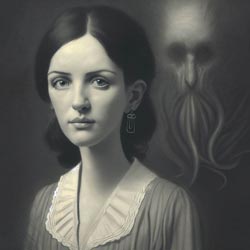 This concise biography explores the life of Zealia Bishop, a noteworthy contributor to the realm of Lovecraftian literature. It delves into her relationship with H.P. Lovecraft and her subsequent literary endeavors, unearthing the shared attributes and unique disparities in their works. The biography underscores Bishop's own legacy, often overshadowed by Lovecraft, providing a refreshing perspective on this overlooked literary figure.
This concise biography explores the life of Zealia Bishop, a noteworthy contributor to the realm of Lovecraftian literature. It delves into her relationship with H.P. Lovecraft and her subsequent literary endeavors, unearthing the shared attributes and unique disparities in their works. The biography underscores Bishop's own legacy, often overshadowed by Lovecraft, providing a refreshing perspective on this overlooked literary figure.
 This comprehensive review analyses H.P. Lovecraft's "The Whisperer in Darkness", discussing its intricate crafting of horror and mystery, while acknowledging criticisms regarding the unveiling of its extraterrestrial entities, the Mi-Go. The narrative uses science fiction elements to enhance its horror, employing contemporary scientific notions such as brain transplantation. The story showcases Lovecraft's adeptness in epistolary storytelling and contributes significantly to his oeuvre despite noted imperfections.
This comprehensive review analyses H.P. Lovecraft's "The Whisperer in Darkness", discussing its intricate crafting of horror and mystery, while acknowledging criticisms regarding the unveiling of its extraterrestrial entities, the Mi-Go. The narrative uses science fiction elements to enhance its horror, employing contemporary scientific notions such as brain transplantation. The story showcases Lovecraft's adeptness in epistolary storytelling and contributes significantly to his oeuvre despite noted imperfections.
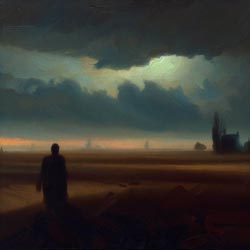 This review essay dives deep into H.P. Lovecraft's "The Curse of Yig," a tale of psychological and cosmic horror set in the Oklahoman frontier. Despite certain ethnographic shortcomings, Lovecraft's blending of local folklore and cosmic horror, as well as his adept creation of suspense, are highlighted and celebrated. The tale's unique contribution to Lovecraft's broader body of work is also explored.
This review essay dives deep into H.P. Lovecraft's "The Curse of Yig," a tale of psychological and cosmic horror set in the Oklahoman frontier. Despite certain ethnographic shortcomings, Lovecraft's blending of local folklore and cosmic horror, as well as his adept creation of suspense, are highlighted and celebrated. The tale's unique contribution to Lovecraft's broader body of work is also explored.
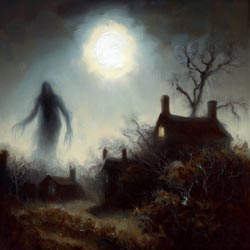 This comprehensive review navigates the terrifying landscapes of H.P. Lovecraft's "The Dunwich Horror," examining its intricate melding of mundane and cosmic horror. Through in-depth exploration of the narrative's plot, characters, themes, and Lovecraft's distinctive style, the review shines a light on the author's unparalleled ability to evoke fear and curiosity. The essay acknowledges criticism while offering counter perspectives, culminating in a balanced analysis of the work's placement within Lovecraft's corpus. The review also engages with scholarly commentary by notable critics, amplifying its comprehensive critique of this seminal piece of horror literature.
This comprehensive review navigates the terrifying landscapes of H.P. Lovecraft's "The Dunwich Horror," examining its intricate melding of mundane and cosmic horror. Through in-depth exploration of the narrative's plot, characters, themes, and Lovecraft's distinctive style, the review shines a light on the author's unparalleled ability to evoke fear and curiosity. The essay acknowledges criticism while offering counter perspectives, culminating in a balanced analysis of the work's placement within Lovecraft's corpus. The review also engages with scholarly commentary by notable critics, amplifying its comprehensive critique of this seminal piece of horror literature.
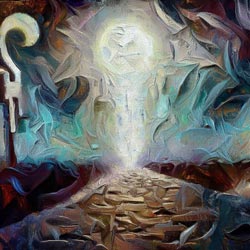 This comprehensive review critically examines H.P. Lovecraft's "The Silver Key", exploring its intricate, introspective themes, philosophical undertones, and stylistic eccentricities. Drawing upon various scholarly perspectives, the piece delves into the narrative's exploration of cosmic horror and personal disenchantment, highlighting Lovecraft's unique fusion of the mundane and the fantastical. By scrutinizing the shifting depictions of Randolph Carter's journey and its implications, the review articulates the enduring significance and broader thematic patterns within Lovecraft's works.
This comprehensive review critically examines H.P. Lovecraft's "The Silver Key", exploring its intricate, introspective themes, philosophical undertones, and stylistic eccentricities. Drawing upon various scholarly perspectives, the piece delves into the narrative's exploration of cosmic horror and personal disenchantment, highlighting Lovecraft's unique fusion of the mundane and the fantastical. By scrutinizing the shifting depictions of Randolph Carter's journey and its implications, the review articulates the enduring significance and broader thematic patterns within Lovecraft's works.
Despite acknowledging the tale's divisive reception, it concludes by emphasizing "The Silver Key" as a crucial piece within Lovecraft's oeuvre, embodying his dark, complex, and macabre narrative style.
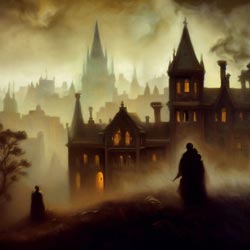 In the shadowy annals of Lovecraft's oeuvre, "The Last Test" stands as a curious outlier, a harrowing symphony of suspense and science, scribed in concert with Adolphe de Castro. This uncanny collaboration has birthed a narrative that simultaneously adheres to and deviates from the quintessential Lovecraftian ethos, merging the gothic elements of the weird tradition with an undercurrent of medical and psychological terror (Borges, 1969). The atmosphere of dread that pervades the tale, punctuated by the horrific realization of mankind's fragility against the encroaching unknown, bears the indelible stamp of Lovecraft's pen.
In the shadowy annals of Lovecraft's oeuvre, "The Last Test" stands as a curious outlier, a harrowing symphony of suspense and science, scribed in concert with Adolphe de Castro. This uncanny collaboration has birthed a narrative that simultaneously adheres to and deviates from the quintessential Lovecraftian ethos, merging the gothic elements of the weird tradition with an undercurrent of medical and psychological terror (Borges, 1969). The atmosphere of dread that pervades the tale, punctuated by the horrific realization of mankind's fragility against the encroaching unknown, bears the indelible stamp of Lovecraft's pen.
- Lovecraft - The Shunned House, A Review
- Lovecraft - Cool Air, A Review
- Who is Rumi?
- Lovecraft's Chef-d'oeuvre - The Call of Cthulhu, A Review
- Lovecraft - Pickman's Model, A Review
- Lovecraft - The Colour out of Space, A Review
- Lovecraft - Two Black Bottles, A Review
- Lovecraft - The Green Meadow, A Review
- Lovecraft - The Horror at Red Hook, A Review
- Lovecraft - He, A Review






